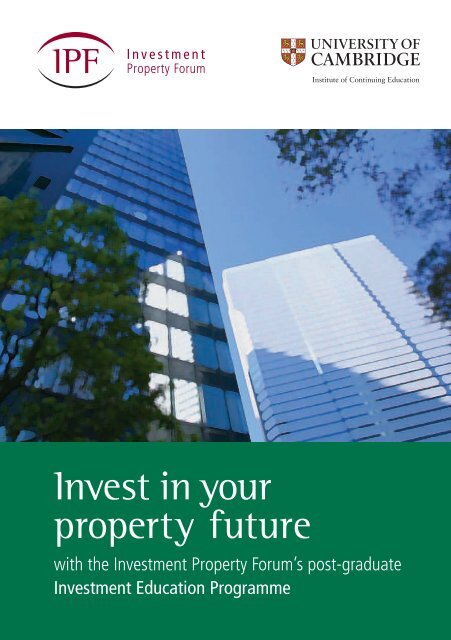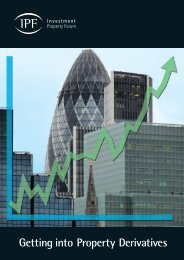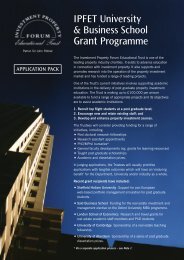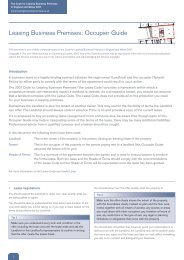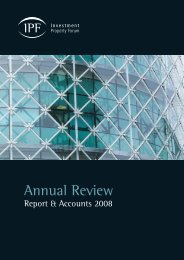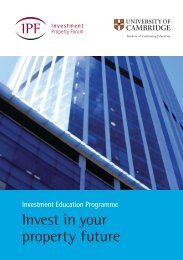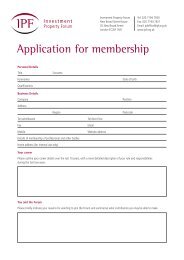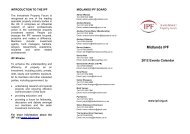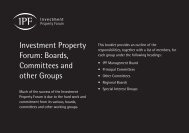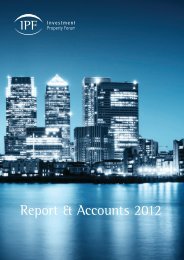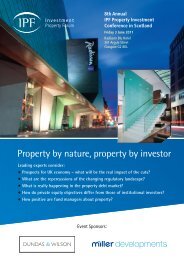Download a copy of the new 2012-2013 brochure (Pdf 699KB)
Download a copy of the new 2012-2013 brochure (Pdf 699KB)
Download a copy of the new 2012-2013 brochure (Pdf 699KB)
Create successful ePaper yourself
Turn your PDF publications into a flip-book with our unique Google optimized e-Paper software.
Invest in yourproperty futurewith <strong>the</strong> Investment Property Forum’s post-graduateInvestment Education Programme
ContentsThe Investment Education Programme 2The Investment Property Forum 3The Institute <strong>of</strong> Continuing Education (ICE) 4Introduction to Property Investment 5Virtual Learning Environment (VLE) 5Qualifications & Awards 6The modules:Investment Valuation & Portfolio Theory 8Financial Instruments & Investment Markets 10Property Investment Appraisal 12Property Finance & Funding 14Indirect Property Investment 16International Property Investment 18Portfolio Management 20Frequently Asked Questions 22Past Contributors 24Inserts (pocket inside back cover):Timetable & FeesWho’s Who?1
The InvestmentEducation ProgrammeEducationStay one step ahead in a fast moving and global market with <strong>the</strong> InvestmentProperty Forum’s well established education programme. By addressing <strong>the</strong> keyareas <strong>of</strong> investment, finance and property, ensure that your knowledge and skillsare right up to date. Drawing on <strong>the</strong> expertise <strong>of</strong> leading practitioners andacademics, <strong>the</strong> IPF investment education modules <strong>of</strong>fer an applied, practicalapproach underpinned by <strong>the</strong> latest academic research.BackgroundThe Investment Property Forum’s Investment Education Programme (IEP) has beendelivered by <strong>the</strong> University <strong>of</strong> Cambridge Institute <strong>of</strong> Continuing Education since2009. Since its inception 10 years ago, <strong>the</strong> Education Programme has seen over175 individuals achieve <strong>the</strong> full Diploma, and over 600 individuals take one ormore modules.Aims <strong>of</strong> <strong>the</strong> Programme• To improve <strong>the</strong> skills and knowledge <strong>of</strong> IPF members and o<strong>the</strong>rs and to engage<strong>the</strong>m in debate about issues affecting property investment;• to provide a wide range <strong>of</strong> formal education relevant to property investment,for IPF members and o<strong>the</strong>rs in <strong>the</strong> UK and, where appropriate, abroad; and• to provide education for <strong>the</strong> general investment community and o<strong>the</strong>r relevantparties about property investment.2www.ice.cam.ac.uk/ipf
Set up in 1988, <strong>the</strong> Investment Property Forum (IPF) is recognised as one <strong>of</strong> <strong>the</strong>leading specialist property industry bodies in <strong>the</strong> UK. It comprises an influentialnetwork <strong>of</strong> senior pr<strong>of</strong>essionals all active in <strong>the</strong> property investment market.The strength <strong>of</strong> <strong>the</strong> organisation lies in its diversity <strong>of</strong> its membership <strong>of</strong> over1,800, including investment agents, fund managers, bankers, lawyers, researchers,academics, actuaries and o<strong>the</strong>r related pr<strong>of</strong>essionals. It operates in London, Scotland,<strong>the</strong> Midlands and <strong>the</strong> North <strong>of</strong> England.To find out more about <strong>the</strong> IPF and its activities, please visit <strong>the</strong> IPF website –www.ipf.org.uk.Our MissionThe IPF's mission is to enhance <strong>the</strong> understanding and efficiency <strong>of</strong> property as aninvestment, including public, private, debt, equity and syn<strong>the</strong>tic exposure, for itsmembers and o<strong>the</strong>r interested parties, including government, by:• undertaking research and special projects and ensuring effectivecommunication <strong>of</strong> this work;• providing education; and• providing a forum for fellowship, discussion and debateamongst our members and <strong>the</strong> wider investment community.IPF Next Generation GroupEspecially for individuals with between 5 and 15 years’ experience in <strong>the</strong> UKproperty investment market, <strong>the</strong> Next Generation Group organises events, briefingsand networking opportunities, in addition to <strong>the</strong> benefits you already enjoy as anIPF member.3www.ipf.org.uk
The Institute <strong>of</strong> Continuing Education (ICE) provides opportunities for adult learners tostudy at <strong>the</strong> University <strong>of</strong> Cambridge on a part-time basis. With options ranging fromweekend courses right up to two-year Masters programmes, it has more than 8,000student enrolments each year from all over <strong>the</strong> world.As an academic department <strong>of</strong> <strong>the</strong> University, ICE is committed to <strong>the</strong> higheststandards <strong>of</strong> excellence. All <strong>of</strong> <strong>the</strong> pr<strong>of</strong>essional courses and qualifications in itsportfolio are developed with guidance from leading Cambridge academics incollaboration with specialist industry bodies such as <strong>the</strong> IPF.ICE was founded in 1873, and was <strong>the</strong> first English university department to embracecontinuing education. It is based at Madingley Hall, an historic 16th-century manorhouse with 21st-century facilities, including state-<strong>of</strong>-<strong>the</strong>-art teaching space andaccommodation for up to 60 students.4The Institute <strong>of</strong> Continuing Education is based at Madingley Hall, Cambridgewww.ice.cam.ac.uk/ipf
Introduction to PropertyInvestmenteLearning moduleThis online module provides an introduction to property as an investment asset class.The content includes:• Property as part <strong>of</strong> <strong>the</strong> UK economy• Direct investment in property• Financing property investment• Indirect investment in property• Risk / return pr<strong>of</strong>ile <strong>of</strong> property• Investment performance <strong>of</strong> property• Regulation, tax and accounting as it affects propertyEach subject is broken down into manageable study sections.The module can be taken as part <strong>of</strong> <strong>the</strong> IPF Certificate in Property Investment, on anassessed basis, or as a standalone introduction for those wanting to know more aboutthis market.All learning is conducted on <strong>the</strong> Virtual Learning Environment, with access to interactivecontent and support from <strong>the</strong> Module Leader.ICE’s Virtual Learning EnvironmentThe Virtual Learning Environment (VLE) is ICE's secure, password protected, onlineresource space.You’ll be able to download reading materials, copies <strong>of</strong> presentations and find links torelevant external resources as well as keeping in touch with your fellow delegates via <strong>the</strong>Qmail option. The VLE is also <strong>the</strong> space where you will be asked to upload your finalassignment for marking and where your marks (only seen by you) will be published.To find out more and take a virtual tour, go to this web address:www.ice.cam.ac.uk/courses/online-study5www.ipf.org.uk
Qualifications & AwardsInvestment Property Forum CertificateThe Certificate is awarded on successful completion <strong>of</strong> <strong>the</strong> following modules:Introduction• Introduction to Property Investment (eLearning module)Part I• Investment Valuation and Portfolio Theory (3-day module)• Financial Instruments and Investment Markets (3-day module)This qualification is listed by <strong>the</strong> Financial Services Authority (FSA) as a Key 2 AppropriateExamination under <strong>the</strong> Managing Investments activity. Holders <strong>of</strong> <strong>the</strong> IPF Certificate willneed to complete a Key 3 qualification, namely a UK regulatory examination, to meet <strong>the</strong>full examination requirements for this activity.Investment Property Forum DiplomaThe Diploma is awarded on successful completion <strong>of</strong> <strong>the</strong> following modules:Part I• Investment Valuation and Portfolio Theory• Financial Instruments and Investment MarketsPart II• Property Investment Appraisal• Property Finance and Funding• Indirect Property Investment• International Property Investment• Portfolio ManagementDelegates are invited to collect <strong>the</strong>ir Diplomas at an IEP reception held prior to <strong>the</strong>IPF Annual Lunch in January.Those who successfully achieve <strong>the</strong> IPF Diploma can use <strong>the</strong> designation DipIPF.6www.ice.cam.ac.uk/ipf
Investment Property Forum Educational Trust AwardsTwo awards are presented every year by <strong>the</strong> IPF Educational Trust. Only thoseachieving <strong>the</strong> full Diploma are eligible for <strong>the</strong>se awards:• The Investment Property Forum Educational Trust Module prize for bestperformance in a single module from Part II• The Investment Property Forum Educational Trust John Whalley prize for bestoverall performance in <strong>the</strong> Diploma (highest average mark)Both awards come with a cash prize and are presented at <strong>the</strong> IPF Annual Lunchin January.Hilke Nijmeijer, winner <strong>of</strong> <strong>the</strong> IPF Educational Trust Module Prize 2011.IPF MembershipDelegates taking <strong>the</strong> Diploma are entitled to free student membership <strong>of</strong> <strong>the</strong> IPF for<strong>the</strong> duration <strong>of</strong> <strong>the</strong> course, up to a maximum <strong>of</strong> three years.Those who have completed <strong>the</strong> Diploma are fast-tracked for full IPF membership.7www.ipf.org.uk
Investment Valuation& Portfolio TheorySample Schedule(each day includes lunch and several refreshment breaks)Day One8:45 Registration9:15 Introduction9:30 Basic ma<strong>the</strong>matics10:00 Investment ma<strong>the</strong>matics11:30 Investment project analysis and basic asset valuation14:00 Asset valuation: application16:00 Asset valuation: application (cont’d)17:30 EndDay Two8:45 Arrival9:00 Basic statistics11:30 Regression analysis14:00 Basic portfolio <strong>the</strong>ory16:00 Basic portfolio <strong>the</strong>ory (cont’d)17:30 EndDay Three9:15 Arrival9:30 Index-linked gilts11:30 Duration, volatility & relative value14:30 Risk in a post-CAPM world15:30 Exam17:00 EndA list <strong>of</strong> past contributors to <strong>the</strong> IEP can be found on page 24.8www.ice.cam.ac.uk/ipf
Where London When OctoberWhat is involvedSet pre-course reading and preparation3 days classroom based, including 90 minute examTake-home assignmentFur<strong>the</strong>r information & booking ICE: +44 (0)1223 760860www.ice.cam.ac.uk/ipfAT A GLANCEWhat’s <strong>the</strong> course about?Investment Valuation & Portfolio Theory <strong>of</strong>fers delegates <strong>the</strong> fundamental buildingblocks for understanding property investment ma<strong>the</strong>matics, statistics and <strong>the</strong>irapplication to valuation and portfolio management.This course takes an in-depth look at:• <strong>the</strong> tools required for financial and investment analysis;• basic financial ma<strong>the</strong>matics and statistics;• principles required for constructing a portfolio;• how its performance is measured;• <strong>the</strong> basic forms <strong>of</strong> modelling that can be used in practice; and• practical examples and case studies applying <strong>the</strong>se tools.Who is <strong>the</strong> course for?• anyone wishing to increase <strong>the</strong>ir knowledge <strong>of</strong> financial analysis in propertyinvestment; and• applicants should have at least a working knowledge <strong>of</strong> <strong>the</strong> fundamentals <strong>of</strong>financial and investment analysis to gain fully from <strong>the</strong> course.9www.ipf.org.uk
Financial Instruments& Investment MarketsSample Schedule(each day includes lunch and several refreshment breaks)Day One8:45 Registration9:15 Introduction9:30 The equity market and equity analysis11:45 UK Government fixed-interest securities14:15 Valuation and analysis <strong>of</strong> REITs and real estate16:00 Valuation and analysis <strong>of</strong> REITs and real estate (cont’d)17:30 EndDay Two9:15 Arrival9:30 Corporate bonds10:30 Derivatives11:30 Derivatives12:30 Principles <strong>of</strong> taxation14:00 Property derivatives16:00 Return characteristics: property and o<strong>the</strong>r asset classes17:30 EndDay Three9:15 Arrival9:30 Taxation and real estate investment11:30 Investors and <strong>the</strong>ir liabilities12:00 Additional teaching, if required13:00 Group presentations15:30 Exam17:00 End10A list <strong>of</strong> past contributors to <strong>the</strong> IEP can be found on page 24.www.ice.cam.ac.uk/ipf
Where London When NovemberWhat is involvedSet pre-course reading and preparation3 days classroom based, including 90 minute examTake-home assignmentFur<strong>the</strong>r information & booking ICE: +44 (0)1223 760860www.ice.cam.ac.uk/ipfAT A GLANCEWhat’s <strong>the</strong> course about?Join your fellow delegates in examining each <strong>of</strong> <strong>the</strong> securities markets, <strong>the</strong>instruments available in those markets and putting <strong>the</strong> different investments intoperspective. An important part <strong>of</strong> this course is to introduce you to <strong>the</strong> characteristics<strong>of</strong> <strong>the</strong> major investors and <strong>the</strong> terminology used in <strong>the</strong> securities markets. Propertyinvestment vehicles will be introduced into <strong>the</strong> course where analytical techniquesthat are <strong>of</strong> general use across investment markets can be applied to propertyinvestment vehicles.This course takes an in-depth look at:• how equities and bonds differ from property;• methods <strong>of</strong> analysis <strong>of</strong> different types <strong>of</strong> investments and derivative products;• why different types <strong>of</strong> investor have different liability pr<strong>of</strong>iles and differentperformance requirements from <strong>the</strong>ir investments;• <strong>the</strong> different types <strong>of</strong> investment instrument available and how <strong>the</strong>y are traded;• how indirect forms <strong>of</strong> property investment and <strong>the</strong>ir characteristics relate bothto direct property investment and o<strong>the</strong>r investment instruments; and• aspects <strong>of</strong> <strong>the</strong> regulatory and tax framework under which property investmentmarkets operate.Who is <strong>the</strong> course for?Anyone wishing to increase <strong>the</strong>ir knowledge <strong>of</strong> pr<strong>of</strong>essional investment, as well asmore experienced property pr<strong>of</strong>essionals wishing to update <strong>the</strong>ir knowledge.11www.ipf.org.uk
Property InvestmentAppraisalSample Schedule(each day includes lunch and several refreshment breaks)Day One8:45 Registration9:00 Introduction9:15 Valuation fundamentals11:15 Concepts and bases in appraisal13:45 The DCF model – an introduction15:45 Individual property appraisal information needs for a cash flow model17:30 EndDay Two8:45 Arrival9:15 Development appraisal workshop and case study11:15 Individual property appraisal: forecasting techniques12:15 Individual property appraisal: forecasting – uses in appraisal14:15 Risk evaluation16:15 In class project17:30 EndDay Three9:15 Arrival9:30 Leases and <strong>the</strong>ir impact on values11:15 Rationality in investment markets13:45 Review15:15 Exam16:45 EndA list <strong>of</strong> past contributors to <strong>the</strong> IEP can be found on page 24.12www.ice.cam.ac.uk/ipf
Where London When JanuaryWhat is involvedSet pre-course reading and preparation3 days classroom based, including 90 minute examTake-home assignmentFur<strong>the</strong>r information & booking ICE: +44 (0)1223 760860www.ice.cam.ac.uk/ipfAT A GLANCEWhat’s <strong>the</strong> course about?Expand your knowledge <strong>of</strong> <strong>the</strong> property valuation process on this course. Examinecurrent practices and <strong>the</strong>ir application. Learn about alternatives to <strong>the</strong>se and explore<strong>the</strong> most current <strong>the</strong>ories and techniques. Take a closer look at <strong>the</strong> market andconstitutional context within which valuation takes place.This course takes an in-depth look at:• <strong>the</strong> main appraisal approaches from a critical perspective;• ways <strong>of</strong> adapting appraisal techniques to meet changes in market conditionsand circumstances;• cutting edge developments in <strong>the</strong> field <strong>of</strong> property appraisal; and• <strong>the</strong> difficulties <strong>of</strong> appraising flexible lease forms.Who is <strong>the</strong> course for?• Experienced practitioners looking to update <strong>the</strong>ir appraisal techniques.NB. Prior understanding <strong>of</strong> spreadsheets is required.13www.ipf.org.uk
Property Finance& FundingSample Schedule(each day includes lunch and several refreshment breaks)Day One8:45 Registration9:15 Introduction9:30 Global financial crisis and impact on property finance(types and sources <strong>of</strong> property finance)10:30 Mind <strong>the</strong> debt funding gap11:50 A borrower’s perspective: ‘Using o<strong>the</strong>r people’s money’14:30 Group task 116:00 Property derivatives: applications for risk and portfolio management18:00 EndDay Two8:45 Arrival9:00 Loan terms, costs and risk management <strong>of</strong> senior debt10:00 CMBS market: picking up <strong>the</strong> pieces after <strong>the</strong> crash11:50 Current economic environment, interest rate trends and predictions14:30 Palmer Capital case study15:45 Group task 218:00 End14Day Three8:45 Arrival9:00 Impact <strong>of</strong> finance structures10:00 Impact <strong>of</strong> finance structures (cont)11:20 Group task 313:40 Keynote discussion: Evolution <strong>of</strong> finance markets in a property contextWhere to go from here?15:30 Exam17:00 EndA list <strong>of</strong> past contributors to <strong>the</strong> IEP can be found on page 24.www.ice.cam.ac.uk/ipf
Where London When MarchWhat is involvedSet pre-course reading and preparation3 days classroom based, including 90 minute examTake-home assignmentFur<strong>the</strong>r information & booking ICE: +44 (0)1223 760860www.ice.cam.ac.uk/ipfAT A GLANCEWhat’s <strong>the</strong> course about?Explore <strong>the</strong> complex issues surrounding finance & funding whilst gaining anunderstanding <strong>of</strong> <strong>the</strong> conditions surrounding provision, <strong>the</strong> use <strong>of</strong> debt and equity incorporate and project form at an advanced level. The course takes a case studyapproach to explore <strong>the</strong> qualitative and quantitative analysis necessary to fullyappreciate <strong>the</strong> risk/return implications <strong>of</strong> <strong>the</strong> various forms <strong>of</strong> finance.This course takes an in-depth look at:• how to identify appropriate sources and types <strong>of</strong> finance & funding;• <strong>the</strong> implications <strong>of</strong> leverage in property investment;• cash flow analysis <strong>of</strong> structured finance;• different forms <strong>of</strong> debt and equity finance and <strong>the</strong>ir effect on investment riskand return;• risk hedging techniques and <strong>the</strong>ir use to limit exposure to different forms<strong>of</strong> risk; and• tax and accounting issues affecting property finance.Who is <strong>the</strong> course for?Experienced pr<strong>of</strong>essionals and those following <strong>the</strong> Diploma Programme.15www.ipf.org.uk
Where London When AprilWhat is involvedSet pre-course reading and preparation3 days classroom based, including 90 minute examTake-home assignmentFur<strong>the</strong>r information & booking ICE: +44 (0)1223 760860www.ice.cam.ac.uk/ipfAT A GLANCEWhat’s <strong>the</strong> course about?With expert input and guidance, explore <strong>the</strong> main indirect investment routes – listed,unlisted and derivatives – and <strong>the</strong> advantages and pitfalls <strong>of</strong> <strong>the</strong>se vehicles todifferent investors.This course takes an in-depth look at:• matching investor requirements to <strong>the</strong> investment characteristics <strong>of</strong> indirectproperty investment vehicles;• <strong>the</strong> risk/return pr<strong>of</strong>iles <strong>of</strong> indirect property investment vehicles within abalanced investment portfolio;• <strong>the</strong> operational implications for investors <strong>of</strong> indirect investment including feestructures and legal structures;• <strong>the</strong> strengths and weaknesses <strong>of</strong> retail products in <strong>the</strong> indirect investmentmarket and match to individual investor specifications;• investment structures in <strong>the</strong> UK, <strong>of</strong>f-shore, Europe, and <strong>the</strong> US from <strong>the</strong>perspective <strong>of</strong> contrasting investor pr<strong>of</strong>iles and preferences; and• <strong>the</strong> appropriate inclusion <strong>of</strong> indirect property investments into an investmentstrategy taking account <strong>of</strong> contrasting investor pr<strong>of</strong>iles and preferences.Who is <strong>the</strong> course for?Experienced pr<strong>of</strong>essionals and those following <strong>the</strong> Diploma Programme.17www.ipf.org.uk
International PropertyInvestmentSample Schedule(each day includes lunch and several refreshment breaks)Day One9:30 Registration10:00 Introduction & rationale for global investments relativeinvestment matrix10:45 Discussion on country research and preparation for grouppresentations11:45 Approach to international investingMarket update: Asia-Pacific14:30 Market update: USA16:15 Risk ranking national markets18:00 EndDay Two9:15 Arrival9:30 Market update: Europe10:45 Case study: currency markets & hedging12:00 Case study: global indirect investment14:00 Legal structures: accessing markets15:00 Case study16.15 Group case study presentations: Europe18:00 End18Day Three9:15 Arrival9:30 Group case study presentations: America and Asia10:45 Global joint venture investing/structuring12:15 Investing in Emerging Markets14:30 Case study: global investment portfolio15:45 Exam17:15 EndA list <strong>of</strong> past contributors to <strong>the</strong> IEP can be found on page 24.www.ice.cam.ac.uk/ipf
Where London When JuneWhat is involvedSet pre-course reading and preparation3 days classroom based, including 90 minute examTake-home assignmentFur<strong>the</strong>r information & booking ICE: +44 (0)1223 760860www.ice.cam.ac.uk/ipfAT A GLANCEWhat’s <strong>the</strong> course about?Examine how <strong>the</strong> core skills in property investment can be applied in an internationalcontext. You will examine case studies <strong>of</strong> major markets, however, during <strong>the</strong> moduleto compare and contrast domestic and international property investment processesand practices and provide an important practical context.This course takes an in-depth look at:• <strong>the</strong> rationale for adopting an international investment strategy and <strong>the</strong> associatedrisks and rewards;• <strong>the</strong> contextual differences (e.g. tenure lease lengths, organisational structures)between key international property markets;• current trends and <strong>the</strong>mes in international property investment markets;• international property data sources and performance measurement issues relevantto international investment;• <strong>the</strong> role <strong>of</strong> currency risk in international investment; and• <strong>the</strong> different roles that direct and indirect investment can play in an internationalstrategy.Who is <strong>the</strong> course for?Experienced pr<strong>of</strong>essionals and those following <strong>the</strong> Diploma Programme.19www.ipf.org.uk
PortfolioManagementSample Schedule(each day includes lunch and several refreshment breaks)Day One8:45 Registration9:30 Introduction & Modern portfolio and capital market <strong>the</strong>ories11:00 Constructing a European real estate portfolio14:00 Index models15:15 Tactical management <strong>of</strong> property portfolios17:15 EndDay Two8:45 Arrival9:00 Constructing a property portfolio: a practitioner’s perspective11:30 Performance measurement14:00 Risk-adjusted performance measurement16:00 Real estate in a multi-asset portfolio17:30 EndDay Three8:45 Arrival9:15 In class assessment10:50 Modelling risk in real estate development12:30 Liquidity risk in commercial property13:00 IPF’s research programme14:00 Portfolio selection in <strong>the</strong> presence <strong>of</strong> liabilities16:45 Computer exercise – finalise project17:30 EndA list <strong>of</strong> past contributors to <strong>the</strong> IEP can be found on page 24.20www.ice.cam.ac.uk/ipf
Where London When SeptemberWhat is involvedSet pre-course reading and preparation3 days classroom based, including 90 minute examTake-home assignmentFur<strong>the</strong>r information & booking ICE: +44 (0)1223 760860www.ice.cam.ac.uk/ipfAT A GLANCEWhat’s <strong>the</strong> course about?Presenting <strong>the</strong> latest thinking on issues and techniques in portfolio management.Critically examine <strong>the</strong> role <strong>of</strong> property in a multi-asset portfolio and appreciate <strong>the</strong>need for measurement and control <strong>of</strong> risk at portfolio level.The course builds on <strong>the</strong> fundamentals presented in module 1, ‘Investment Valuation& Portfolio Theory’, embracing both <strong>the</strong>oretical and practical concepts.This course takes an in-depth look at:• how investment tools can be employed in structuring portfolios;• how to control portfolio risk;• <strong>the</strong> role <strong>of</strong> liquidity risk; and• <strong>the</strong> risk-and-return characteristics <strong>of</strong> commercial property.Who is <strong>the</strong> course for?Anyone with experience in portfolio management who wants to acquire <strong>the</strong> latestthinking on issues and techniques and those following <strong>the</strong> Diploma Programme.21www.ipf.org.uk
Frequently Asked QuestionsAre <strong>the</strong>re any entry requirements for <strong>the</strong> IPF Certificate and Diploma inProperty Investment?Yes. Applicants should be graduates with at least a 2nd class degree (or equivalent iffrom outside <strong>the</strong> UK) and a minimum <strong>of</strong> three years’ work experience in a relevantindustry. You must be fluent in both written and spoken English (with a minimumIELTS level 7 or higher). Pr<strong>of</strong>essional qualifications are also considered an advantage.What are <strong>the</strong> CPD opportunities <strong>of</strong>fered by <strong>the</strong> IEP modules?For RICS purposes, a three-day module <strong>of</strong>fers at least 18 hours <strong>of</strong> coursework, inaddition to <strong>the</strong> time spent on prior study and on completing <strong>the</strong> post-moduleassignment.Each <strong>of</strong> <strong>the</strong> modules in <strong>the</strong> IEP satisfies 100% <strong>of</strong> a solicitor’s annual unaccredited CPD.I’m really busy at work, how much time should I expect to spend oneach module?We understand that it can be really tough combining study with a full-time job ando<strong>the</strong>r commitments, but it is essential that you find enough time for modulepreparation. Approximately a month before <strong>the</strong> module starts, you will be givenaccess to our online resource site (<strong>the</strong> VLE) where you can download <strong>the</strong> modulehandbook. You are expected to read this at least once before <strong>the</strong> module begins –pre-reading forms an integral part <strong>of</strong> <strong>the</strong> course. Occasionally you will be asked todo some additional research and preparation before a module starts. Following yourthree-day classroom-based learning, <strong>the</strong>re will be a take-home assignment for youto complete.Is each course assessed?22Yes. There are two assessed elements to each course: an in-class exam (comprising aseries <strong>of</strong> questions) and a take-home assignment (normally in essay form). To pass <strong>the</strong>module, you must achieve an aggregate mark <strong>of</strong> 50%. If you are not intending tostudy for <strong>the</strong> IPF Certificate or Diploma, assessment is not compulsory.www.ice.cam.ac.uk/ipf
What happens if I fail one or both <strong>of</strong> <strong>the</strong> assessed elements?If you fail one or both parts <strong>of</strong> <strong>the</strong> assessment and do not achieve <strong>the</strong> aggregate passmark, you will be <strong>of</strong>fered <strong>the</strong> opportunity to re-sit or re-submit <strong>the</strong> failed assessmenton one occasion only. If you do not achieve a pass on re-submission, you will have tore-apply to take <strong>the</strong> module again <strong>the</strong> following year.Can I take <strong>the</strong> modules out <strong>of</strong> order?You can but we would advise that <strong>the</strong> modules are taken in <strong>the</strong> order <strong>the</strong>y run as <strong>the</strong>ybuild on one ano<strong>the</strong>r.Can I take just one module?Yes, you can pick any module to study but we may advise you to start with <strong>the</strong> onlinemodule, Introduction to Property Investment, if you do not meet <strong>the</strong> entry criteria.Do I have to pay for all <strong>the</strong> modules at once?No, you – or your sponsor – can pay on a module by module basis.Where’s <strong>the</strong> course held?The classroom based modules are delivered in central London.Where can I stay?You will need to make your own accommodation arrangements but <strong>the</strong>re are anumber <strong>of</strong> reasonable hotels close to <strong>the</strong> venue.What’s <strong>the</strong> connection between <strong>the</strong> University <strong>of</strong> Cambridge and <strong>the</strong> IPF?The University <strong>of</strong> Cambridge delivers <strong>the</strong> IPF Certificate and Diploma programme inInvestment Education on behalf <strong>of</strong> <strong>the</strong> IPF.Is <strong>the</strong> Diploma <strong>of</strong>ficially awarded by <strong>the</strong> University <strong>of</strong> Cambridge?No. The Diploma is a pr<strong>of</strong>essional qualification awarded by <strong>the</strong> IPF.23www.ipf.org.uk
Past Contributors24Nigel Almond, DTZAndrew Appleyard, Aviva InvestorsCarl Bacon, StatPro GroupPaul Batho, NARANatalie Bayfield, Bayfield TrainingTim Bellman, ING Real Estate InvestmentManagementGerald Blundell, ConsultantShaun Bond, University <strong>of</strong> CincinnatiPhilip Booth, Institute <strong>of</strong> Economic AffairsMark Callender, SchrodersDonovan Campbell, Morgan StanleyGraham Chase, Chase & PartnersTami Chuang, DTZDhananjai, ING Real Estate InvestmentManagementLouise Ellison, Quintain Estates andDevelopmentWill Gabby, Hermes Real EstateÖrn Greif, BNP Paribas Real EstateInvestment ManagementFerhat Guven, Paladin Realty PartnersMat<strong>the</strong>w Hall, DTZAndrew Hook, Aviva InvestorsNadja Savic de Jager, CBRE InvestorsMark Jones, Jones Lang LaSalleSimon Jones, Hymans RobertsonXavier Jongen, Bouwfonds Real EstateInvestment ManagementCompanies correct at time <strong>of</strong> teaching.Jeremy Kelly, Jones Lang LaSalleTony Key, Cass Business SchoolBart Kruijssen, PricewaterhouseCoopersMichael Lister, University <strong>of</strong> WestminsterColin Lizieri, University <strong>of</strong> CambridgeGianluca Marcato, Reading UniversitySimon Marshall, NationwideTony McGough, DTZPaul Mitchell, Paul Mitchell ConsultancyPaul Ogden, inProp CapitalBarry Osilaja, Jones Lang LaSalleIryna Pylypchuk, CBREDominic Reilly, Jones Lang LaSalleDavid Roberts, GrosvenorWill Robson, PRUPIMMelville Rodrigues, CMS Cameron McKennaBen Sanderson, Hermes Real EstateJudy Smith, Kingston UniversityEva Steiner, University <strong>of</strong> CambridgeLee Sheldon, Clifford ChanceRupert Sheldon, Palmer Capital PartnersKeith Steventon, BNP Paribas Real EstateDarren Stolzenberg, NabarroChris Turner, ING Real Estate InvestmentManagementRoberto Varandas, UBSNick White, Morgan Stanleywww.ice.cam.ac.uk/ipf
Timetable & FeesWho’s Who?
Who’s WhoProgramme Advisory CommitteeThe Programme Advisory Committee directs <strong>the</strong> Investment Education Programme.Philip Allmendiger Dept <strong>of</strong> Land Economy, University <strong>of</strong> CambridgePaul Batho IEP Course DirectorIan BaxterInstitute <strong>of</strong> Continuing EducationFrankie Clay Investment Property ForumSue Forster Investment Property ForumRebecca Lingwood Institute <strong>of</strong> Continuing EducationColin Lizieri Dept <strong>of</strong> Land Economy, University <strong>of</strong> CambridgeLydia Romero Institute <strong>of</strong> Continuing EducationJohn Story Consultant & Chair <strong>of</strong> Academic GroupAcademic GroupThe Academic Group brings toge<strong>the</strong>r industry knowledge and expertise from <strong>the</strong> IPF andfeeds this into <strong>the</strong> Programme Advisory Committee through its IPF representatives.John Story (Chairman) ConsultantCiaran Carvalho NabarroMark Charlton Colliers InternationalFrankie Trailor Investment Property ForumBob Dyson Jones Lang LaSalleSue Forster Investment Property ForumAndy Hann WP ConsultingMax Johnson ING Real Estate Investment ManagementIan Marcus Credit SuissePhilip NellAviva InvestorsMark Pendower Oak Green EstatesDominic Reilly Jones Lang LaSalleBen Sanderson Hermes Real EstateKaren Sieracki Kaspar Associates
Module LeadersOur module leaders come from both pr<strong>of</strong>essional and academic backgrounds.All are experts in <strong>the</strong>ir field.Investment Valuation and Portfolio TheoryEva Steiner, University <strong>of</strong> CambridgeFinancial Instruments and Investment MarketsPhilip Booth, Institute <strong>of</strong> Economic AffairsProperty Investment AppraisalPaul Batho, NARAProperty Finance and FundingMat<strong>the</strong>w Hall, DTZIndirect Property InvestmentXavier Jongen, Bouwfonds Real Estate Investment ManagementInternational Property InvestmentDhananjai, ING Real Estate Investment ManagementPortfolio ManagementJamie Alcock, University <strong>of</strong> CambridgeCourse DirectorPaul Batho, NARADay-to-dayLydia RomeroFrankie TrailorAcademic Programme Manager, Institute <strong>of</strong> Continuing Education,University <strong>of</strong> Cambridgeemail lr305@ice.cam.ac.uk tel 01223 760863Associate Director – Education, Investment Property Forumemail ftrailor@ipf.org.uk tel 020 7194 7928
Timetable & Fees <strong>2012</strong>/13Introduction to Property InvestmenteLearning module £450Investment Valuation and Portfolio Theory3 day classroom-based module 8-10 October <strong>2012</strong> £1,490Financial Instruments and Investment Markets3 day classroom-based module 19-21 November <strong>2012</strong> £1,490Property Investment Appraisal3 day classroom-based module 4-6 February <strong>2013</strong> £1,490Property Finance and Funding3 day classroom-based module 25-27 March <strong>2013</strong> £1,490Indirect Property Investment3 day classroom-based module 20-22 May <strong>2013</strong> £1,490International Property Investment3 day classroom-based module 24-26 June <strong>2013</strong> £1,490Portfolio Management3 day classroom-based module 23-25 September <strong>2013</strong> £1,490For more information on modules and how to apply, please refer to <strong>the</strong> mainbooklet, or visit <strong>the</strong> IPF or IoCE websites:www.ipf.org.uk or www.ice.cam.ac.uk/ipf


